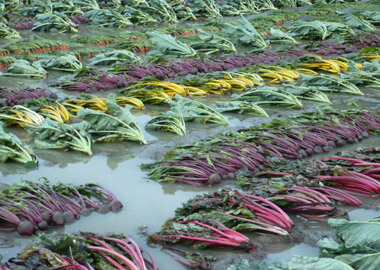In the days right after Hurricane Irene wreaked havoc on so many Valley farms, the folks at South Deerfield’s Community Involved in Sustaining Agriculture, or CISA, rushed to offer what help they could.
The nonprofit worked to help farmers affected by the storm get information about applying for grants and loans from the federal government. It also put out the word that it would help organize fundraisers or community cleanup days for any interested farms. Still, CISA executive director Phil Korman recently said, “We were just like, there’s got to be more we could do.”
Then inspiration struck: CISA decided to set up a zero-interest revolving loan fund to help farmers rebound from the storm. The fund, Korman said, is modeled after the Vermont Farm Fund, a program of the Center for an Agricultural Economy, based in Hardwick, Vt., which has so far awarded $60,000 in loans.
CISA’s Emergency Farm Fund has received a big boost from an individual donor (who has asked not to be publicly identified) who has offered to contribute $50,000 if the group can raise that much from other donors. Fundraising efforts to meet that matching-grant goal got off to a good start when Whole Foods Market committed $15,000 to the effort. Now CISA has launched a public campaign to raise the remaining $35,000, with the hope of raising as much as $100,000. Although created to help farmers hurt by Irene, as a revolving-loan program, it will be available to offer aid following future natural disasters as well.
While Irene did not hit Western Mass. with quite the force that earlier forecasts has predicted, it devastated many farms in the area.
In the days following the Aug. 28 storm came reports of damage done by wind, heavy rain and subsequent flooding, which left many fields covered in silt. Deerfield’s Williams Farm lost dozens of acres of crops when the Deerfield River flooded its fields. At nearby Ciesluk Farm, the corn crop was wiped out. Holyoke’s Nuestras Raices farm lost almost all of its crops, bringing an early end to its farmers’ market season.
According to the Mass. Department of Agricultural Resources—which says agriculture accounts for $500 million in revenue for the state each year—6,300 acres of Massachusetts farmland were affected, causing about $5 million in damage. Western Mass. farms were hit particularly hard.
CISA’s Emergency Farm Fund is now accepting applications for loans, and a committee will begin reviewing them next month, with decisions to be made within 15 business days. The loan review committee includes local farmers, CISA staff and board members, and representatives from Whole Foods, the Mass. DAR and the Equity Trust, which is helping manage the program.
The loan program is open to farms in Franklin, Hampshire and Hampden County that had an annual gross income of at least $20,000 in 2010. The fund will grant interest-free loans of $5,000 to $10,000, to be paid back within three years. The first payment is due one year after the loan is received, although CISA will work for individual farmers to set up payment plans, Korman said.
Farmers affected by Irene are also eligible to apply for aid from the federal government; last month, the state’s request for federal disaster relief was granted, which will allow farmers across the state to apply for assistance, including 4 percent-interest loans from the U.S. Farm Services Agency.
But those programs can take longer to access, Korman noted. “The beauty of this [CISA loan program] is, whatever we can raise now will be available right now,” he said.
Money from the local fund could be used as a bridge loan by farmers who are waiting for word from their insurance companies or from federal aid programs, or who have maxed out their available credit, holding them over until they begin generating new income in the next growing season, Korman said.
To contribute to CISA’s Emergency Farm Fund, or for information about applying for a loan, go to www.buylocalfood.com, or call 413-665-7100. Donations can also be sent to CISA at 1 Sugarloaf St., South Deerfield, Mass. 01373.



